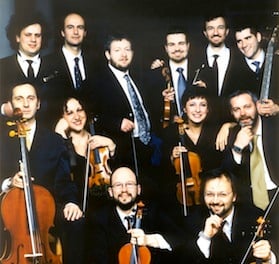
If you think all early music is the same, Fabio Biondi and Europa Galante are determined to prove you wrong. The ensemble, which has been together for 22 years, has made a name for itself with its energetic approach to both the music and the performances. There’s nothing staid about its performances or its enthusiasm for early music, and its earlier performances in the U.S., including those in the Bay Area, have ensured that audiences are equally enthusiastic about the group.
According to Biondi, the group was formed when he asked if he was interested in recording with an Italian ensemble. “I just called some friends that shared the same interest.” The recordings they did with the French record company Opus 111 led to awards and concerts. “Now, 22 years later, we are using the same mechanism of records and concerts. We’re not supported by the Italian government. The atmosphere is great and the ensemble is happy.”
For the upcoming performances in Berkeley on Jan. 27, Biondi says, “We want to show very different aspects of 18th-century music. We jump from very famous and important composers like Bach, who was amazing, to some unknowns, like Brioschi and Scaccia. We use the program to bring adventure to the audience and show the story of the music.
“Briaschi was a symphonist in Milano, one of the fathers of classic symphony. His music shows the Galante style that developed after Baroque. It shows the language of music at the time — how the music language changed — and he was a proponent of the change. Listen to the music from 1740–1745, and it sounds like a young Mozart. It’s exciting. The audience is shocked at the quality of this music. It’s incredible that it’s so good!
“Scaccia is also from Milano, a very famous violinist. He wrote very specific music, like Vivaldi’s, but more complex in terms of harmony. It shows the passage between Baroque style and Galante style. The Handel piece, written when he was young, shows how he was influenced by Galante style and by Italian opera.
“Thanks to Galante style, we can understand the classical style. So we will show the full Galante style and we give the audience a little promenade through the development.”
According to Biondi, his ensemble is always researching and discovering more documents about early music, which makes its programming a work continually in progress. “You change your mind. It’s great. It’s not cold.”
It also feels fresh because the group can put more elements and color into the music, and there’s no doubt that the group has made a reputation of being exciting to watch. Biondi notes that “In our profession, we never forget our special culture, the Italian culture. It’s always been full of energy. Seventeenth-century documents talk about the play in Italy as very active and extroverted. It’s nice we save this part of our culture.” He adds that 20 years ago it was a risk to perform Baroque music like this. Even so, he and the other members of Europa Galante recognize the differences between composers and the various schools, and play accordingly, giving their concerts a breadth of style that might seem unusual for those not familiar with the several schools of early music.
If audiences enjoy the group, the feeling is mutual. Biondi describes the U.S. as a great country with appreciative audiences that are extremely open to enjoying the music and discovering more about it. To discover more about Europa Galante, hear it yourself in Berkeley at the First Congregational Church on Jan. 27, courtesy of Cal Performances.

